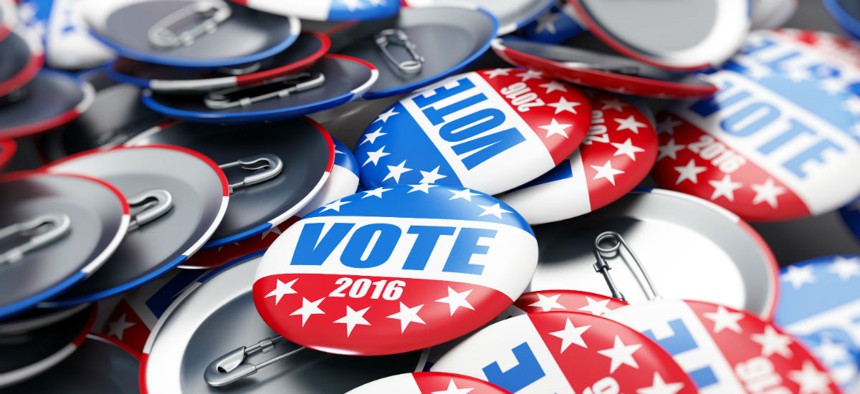
Problems Voting Overseas, Financial Management Help, Fair Pay Dustup and More
A weekly roundup of pay and benefits news.
The 2016 presidential election is drawing attention to the highly decentralized nature of the U.S. election system, where every state seems to operate according to a unique set of rules and deadlines. For military personnel and federal employees serving overseas, figuring out how to vote absentee makes the process even more daunting.
There’s help available for navigating the voting process from overseas. But as the Government Accountability Office pointed out in a report last week, the help itself is confusing to many. To its credit, the Defense Department has taken steps to improve voter assistance efforts through the Federal Voting Assistance Program. But as GAO notes:
“Two long-standing issues—limited awareness of resources for voters and the unpredictable postal delivery of absentee ballots—continue to pose challenges. DOD-commissioned studies and post-election survey results indicate that there is limited awareness of FVAP's resources among military and overseas voters. A 2015 study found, for example, that the online availability of blank ballots led to one of the most significant improvements in military and overseas absentee voting. At the same time, the full benefits of the improvement had not been realized because voters remained unaware that ballots could be requested online.”
Timely postal delivery creates challenges for both receiving and returning ballots by the deadlines, which vary by jurisdiction. The Pentagon has a plan to address the issues, but unfortunately it hasn’t yet established timeframes for implementing the actions, GAO said.
A controversial measure designed to ensure federal contractors are fairly compensated is again under fire. The House Armed Services Committee wants to exempt the Defense Department from the Fair Pay and Safe Workplaces executive order President Obama signed last summer, a move supported by the Professional Services Council, which represents many federal contractors.
The executive order’s proponents are “unfairly accusing critics of condoning wrongdoing,” according to a statement by trade group. According to PSC President and CEO David J. Berteau:
“The Department of Labor already has broad authority to enforce federal labor laws, impose penalties on contractors that violate such laws, and even initiate suspension and debarment proceedings against such contractors. Because of this existing structure, the government already can readily ensure it contracts only with ‘presently responsible’ companies. The EO ignores these processes and creates a broad new compliance and reporting regime that unnecessarily shifts the burden to industry at great expense in time and money with no demonstrated benefit.”
Need some help managing your personal finances? Worried that you may not be saving enough for retirement? Help is on the way, at least for military personnel and their families. The PenFed Foundation just gave the Military Officers Association of America a $100,000 donation to its MOAA Military Family Initiative.
MOAA will use the money to develop financial education materials in conjunction with military transition program coordinators. The content will focus on:
- Strategic money management
- New military retirement plan
- Dollars and cents of working outside the home (optimized for military spouses)
- Legislative issues of interest to the military community
Retired Air Force Lt. Col. Shane Ostrom, a MOAA certified financial planner, will lead the program, which prepares service members for life outside of the military.
NEXT STORY: House Approves Administrative Leave Overhaul






